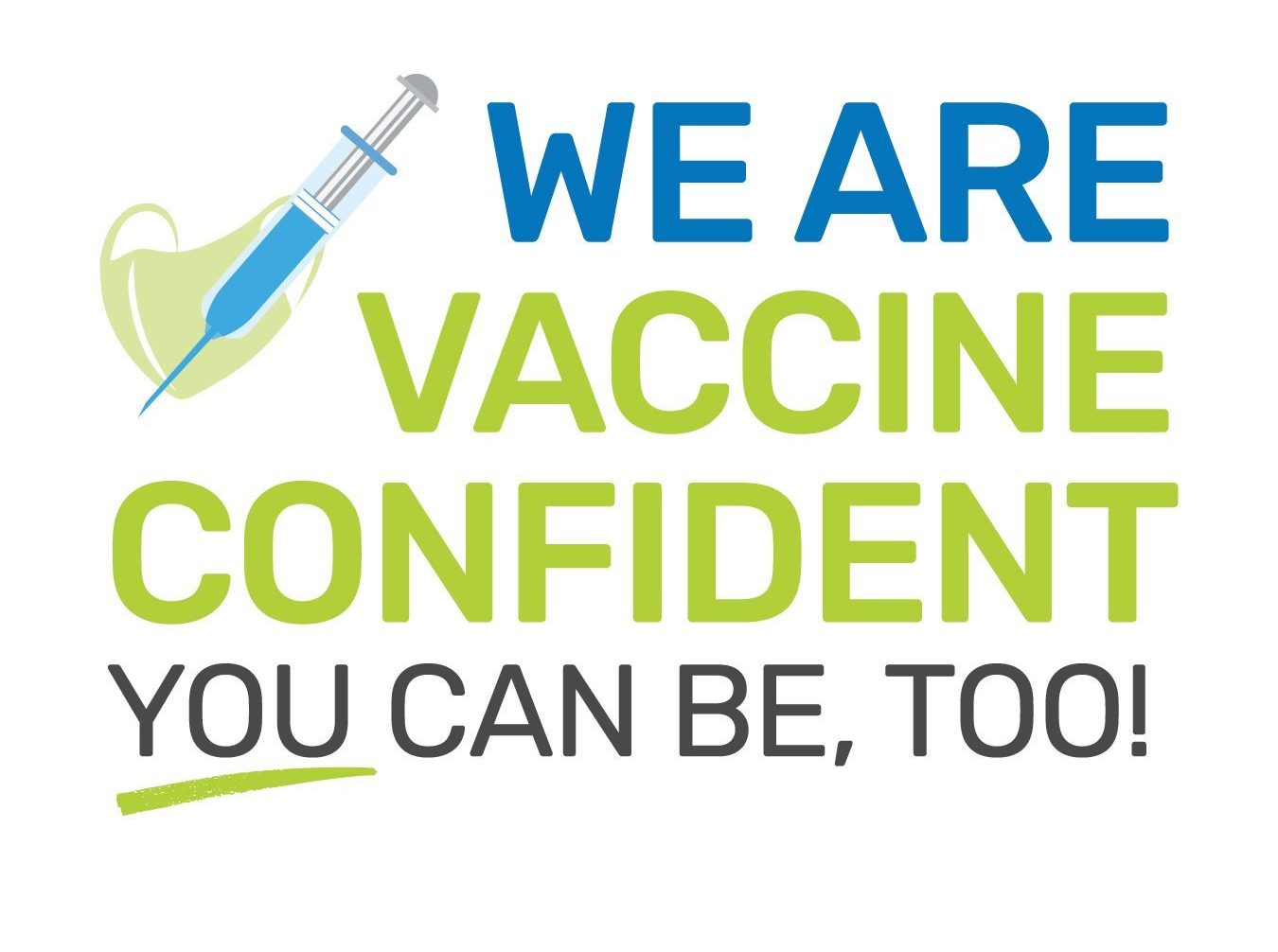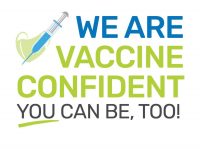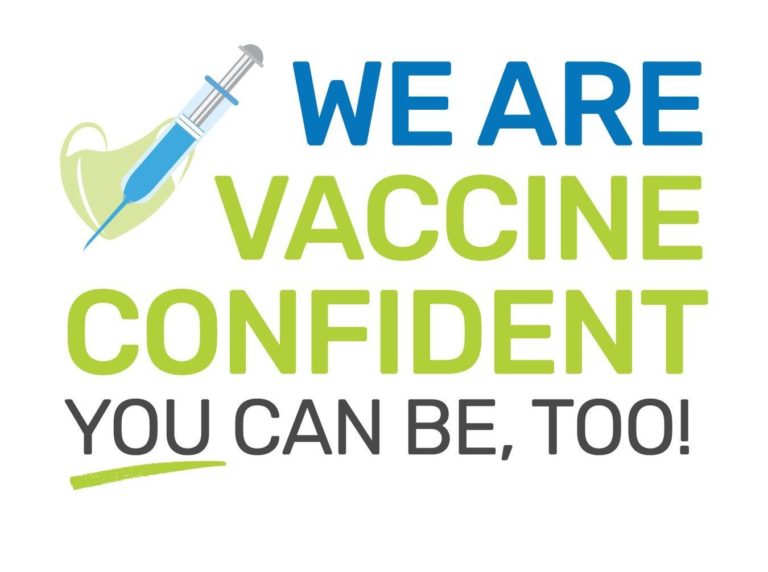
We are Vaccine Confident.
You can be, too!
Here’s why. Vaccines are a critical component to maintain one’s overall health and wellbeing by preventing disease, disability and even death.
The COVID-19 vaccines are no exception.
Why Vaccinations are important
Developed from sound science and backed by evidence-based research, vaccines are one of the most successful tools to protect health on a personal and global scale and are the way out of the COVID-19 pandemic, one of the biggest health crises of the century.
- Vaccines will prevent 419 million illnesses, 26.8 million hospitalizations, and 936,000 deaths for children born between 1994-2018 (NFID)
- 50,000+ adult deaths are attributed to vaccine-preventable diseases each year (NFID)
- Vaccines have kept the United States free of many deadly and/or debilitating diseases, including polio, measles and smallpox, among others.
Doses of routine vaccinations missed in 2020 due to the pandemic
Lives saved from vaccines this year
Looking to be vaccinated for COVID-19?
Frequently Asked Questions*
* These FAQs are intended to respond to questions of a general nature. They are not intended as specific healthcare advice for any individual. Because your healthcare circumstances may vary, you should always check with your own healthcare professional before making decisions.
What are the latest guidelines on COVID-19 vaccination? How do I know if I'm up to date on vaccines and boosters?
The CDC recommends that everyone stay up to date on COVID-19 vaccines, including both primary series doses and boosters for your age and risk group. Booster shots are safe and effective and provide an additional dose of a vaccine to “boost” your immunity and give you better protection from disease.
Children ages 6 months to age 4 should receive all primary series doses, and children ages 5 and up should receive all primary doses and the updated, bivalent booster if eligible. Adults aged 18 and older should also receive all primary doses and the updated booster.
For more detailed information about recommended COVID-19 vaccine and booster schedules, including recommendations for those who are immunocompromised, please click here.
What makes vaccines “safe and effective”?
- Phase 1: Small groups of healthy people enrolled in a trial receive the vaccine. During this phase, the vaccine is evaluated for safety, dosage, and side effects.
- Phase 2: If the first phase meets safety standards, the clinical study is expanded to hundreds of adults who may have health conditions and represent many different backgrounds. In this phase, researchers evaluate safety, side effects, dosage, immune response, and effectiveness.
- Phase 3: The study is expanded to thousands, from a variety of ages and backgrounds. During this phase, researchers evaluate how the vaccine protects people from the disease compared to a placebo.
How do vaccines work?
Vaccines are one of the most powerful medicines and save millions of lives each year. A vaccine works by activating the defensive system in your body, which we call the immune system. The vaccines promote the production of antibodies, which are small particles that attack bacteria and virus and help to combat a disease. After receiving the vaccine, your body develops an immunity to it, without having to get the disease first.
Typically, this is achieved by using a virus that has been killed or weakened. It won’t make you sick, but it will train your body to fight off the sickness caused by the virus in the future. Some vaccines only contain a part of the virus or bacteria.
Because vaccines prevent diseases, rather than treat or cure them, they are considered the most successful advancements for improving health on a global scale.
For more information on all vaccines, please visit here. For more information on the COVID-19 vaccines, please visit here.
Given FDA authorization of COVID-19 vaccines for children 6 months and up, and boosters for ages 5 and up, are you recommending giving the vaccine to kids in these age groups?
The COVID-19 vaccine is highly recommended for children, and as preventive medicine physicians, we encourage everyone eligible to receive the vaccine as soon as possible, and stay up to date with boosters. Sound science backs the safety and efficacy of the vaccine in preventing COVID-19 infection and complications.
We realize that many parents have concerns about the length of time it took to secure approval on the vaccine for children, however this timeline is highly indicative of the rigor with which the vaccine was tested – both to ensure its effectiveness and its safety. There were no serious side effects seen among the thousands of children who participated in the vaccine clinical trials.
With these approvals – we wholeheartedly recommend parents have their children in this age group vaccinated against COVID-19. Vaccinating children not only keeps them safe from COVID-19 related health complications, but it also helps ensure the safety of those around them.
How were the COVID-19 vaccines developed so quickly?
The “coronavirus”, the virus that causes SARS-COV2, or COVID-19 is not just a singular type of virus. In fact, there are hundreds of known coronaviruses, some of which cause disease. Scientists have been studying the coronavirus family of viruses for more than 50 years, so developers of the COVID-19 vaccines were not starting from scratch. Due to the global pandemic, scientists around the world knew the importance of developing a vaccine quickly. International health organizations worked together to fund, develop, and manufacture COVID-19 vaccines that protect individuals and meet the Food and Drug Administration’s (FDA) rigorous requirements for safety and effectiveness.
To assure that the vaccines would be ready quickly, many of the steps were done simultaneously. For example, as the vaccines were used in clinical trials, government and organizations started preparing for their manufacture and distribution, which meant that transitions from one step to the next were done quickly. The vaccines were required to meet the FDA’s rigorous, scientific standards for safety, effectiveness, and manufacturing quality.
What is the Omicron variant? Will my COVID-19 vaccines still work against it?
Omicron is a variant of COVID-19 that, along with its subvariants, has shown to be more transmissible than previous forms of the virus. As with all other variants of COVID-19, our stance remains that prevention remains the best policy. We strongly encourage the public to get vaccinated and stay up to date on boosters.
The original COVID-19 vaccines and boosters have proven to help prevent severe disease, hospitalization, and death during Omicron surges. As of September 2022, bivalent boosters from both Pfizer-BioNTech and Moderna are now authorized – offering broader protection against COVID-19, including the Omicron variant and subvariants.
The Pfizer bivalent booster is authorized for those 12 and up, and the Moderna is authorized for ages 18 and up.
I read recently that there is a warning of a resurgence of measles. How can I protect myself and my children?
Because of the disruption caused by the COVID-19 pandemic, studies have shown that many children missed their routine measles vaccination, leading to a warning of a possible resurgence. Measles, which is a highly contagious disease that can spread rapidly in schools, can cause serious complications if not treated. Measles was considered eliminated in the US in 2000, due in large part to vaccines.
The best way to protect yourself and your children is to get vaccinated as soon as possible. As part of the 7-vaccine standard series of childhood immunizations, the CDC recommends all children get 2 doses of the MMR (measles-mumps-rubella) vaccine starting at 12-15 months of age, and then a second dosage by 4-6 years of age. Children can receive the second dose earlier as long it is at least 28 days after the first dose.
What is emergency use authorization? Are the COVID-19 vaccines safe enough to use if they only got an emergency authorization?
Emergency Use Authorization (EUA) is a mechanism used to facilitate the advancement of life-saving measures like vaccines during public health emergencies when diseases are posing serious or life-threatening risks. Because of the alarming rate of hospitalizations and deaths caused by COVID-19, the FDA approved EUA for certain COVID-19 vaccines after they went through rigorous testing and it was determined that the vaccines were safe and effective for use to protect against hospitalization and death related to COVID-19, and that benefits of the vaccines outweighed the potential risks.
After the EUA was approved, manufacturing companies and other entities are still continuing monitor safety and efficacy of the vaccine, which includes following up with the individuals that participated in the clinical trials.
I felt really awful after receiving my COVID-19 vaccine, and now am hesitant to get my other routine vaccines. Do I still need to get those (flu, shingles, Tdap, pneumonia)?
Some people may experience minor side effects from vaccination, including feeling achy, tired or nauseous. However, these side effects should not stop you from receiving routine vaccinations, which can help prevent you from becoming extremely sick with a disease that can otherwise be prevented.
Staying up to date with your routine vaccinations is critical to ensuring we don’t have another public health crisis and the immunity of the country stays strong. A new study found that 26 million doses of CDC-recommended vaccines were missed in 2020 – potentially leaving millions vulnerable to highly contagious, but preventable diseases.
The CDC recently released guidance that the COVID-19 vaccines and other vaccines can be administered on the same day: https://www.cdc.gov/vaccines/covid-19/clinical-considerations/covid-19-vaccines-us.html#Coadministration
If you are behind on your routine vaccinations, don’t delay and contact your primary care physician today to set up an appointment.
My husband and I are both vaccinated but have been hearing about heart concerns in children (particularly boys). Would like to make informed risk decision based on actual evidence for our 10 year old son regarding cases of myocarditis and pericarditis.
At this time, CDC recommends COVID-19 vaccination for children 12 years and older. Until there are vaccination recommendations for the younger age groups, children between the ages of 2 and 12 should wear a mask in public spaces and around people they don’t live with. In June 2021, the CDC Advisory Committee on Immunization Practices (ACIP) met to discuss the data on reports of mild cases of inflammation of the heart muscle (myocarditis) and surrounding tissue (pericarditis) among vaccinated 16- to 24-year-olds. Myocarditis and pericarditis were found to be extremely rare side effects. The cases were mild, and the children often recovered on their own or with minimal treatment. Cases of myocarditis and pericarditis are much more common with a person develops COVID-19. A peer-reviewed article published in Pediatrics in September 2021 summarizes the clinical course and evaluation of seven cases of acute myocarditis or pericarditis in healthy male adolescents. All patients resolved their symptoms rapidly. Three patients were treated with non-steroidal anti-inflammatory drugs (NSAIDs) only and 4 received intravenous immune globulin (IVIG) and corticosteroids. No causal relationship between vaccine administration and myocarditis has been established.
I have heard mixed messages about the safety of the COVID-19 vaccine and pregnancy. Is the vaccine safe for women who are pregnant or considering starting a family?
Multiple studies have shown that COVID-19 (both mRNA – Pfizer and Moderna, and viral vector – J&J) vaccines are safe during pregnancy. Vaccination during pregnancy may help protect babies from COVID, as antibodies are passed from mother to baby. Unvaccinated pregnant women who get COVID are at high risk for pregnancy complications, and they are more likely to become severely ill compared to vaccinated women.
Are vaccines safe for children?
Vaccines are safe, effective and recommended for children. If your child needs any vaccine, or you do not know if they are up-to-date on their recommended vaccinations, call your primary care physician today to schedule an appointment.
What is the background behind the campaign name, “We are Vaccine Confident. You can be, too!”?
Preventive medicine professionals have overwhelmingly voiced they are vaccine confident, to assure others of the safety and importance of vaccines. In fact, nearly 100% of members of the American College of Preventive Medicine (ACPM) report they have received or are planning to receive the COVID-19 vaccine. Furthermore, the majority of members would recommend the COVID-19 vaccine to family and friends.
The preventive medicine professional’s voice matters.
- They are specially trained at the intersection of public health and clinical practice.
- They understand the scientific process and rigorous review put in place for the coronavirus vaccines, the same as all vaccines — and trust the process and the science behind it.
- Members of the American College of Preventive Medicine have expressed their confidence in the safety and effectiveness of vaccines.
To learn more about preventive medicine and the critical role it plays in saving lives, creating healthier communities and transforming our healthcare system, visit www.acpm.org.
We are vaccine confident
Our team of preventive medicine specialists are here to help. The FAQ is being continuously updated, so check back often.
Vaccine Confident Ambassadors
Meet our Vaccine Confident experts! Preventive medicine professionals work at the critical intersection of public health and clinical practice.
Below is more information on our team of preventive medicine specialists, here to help guide you to be vaccine confident.
Interested in connecting with a Vaccine Confident Ambassador? We can help! Email us at [email protected]
Organization or Community Leaders:
Members of Media:

Wendy G. Lane, MD, MPH
Baltimore, MD
COVID-19 vaccines have gone through rigorous evaluation of their efficacy and potential side effects, and they have now been given to millions of people in the U.S. with very few serious problems. The vaccine may prevent me from getting COVID-19 and will decrease the likelihood that I will need to be hospitalized or die if I do become ill. Communities with high vaccination rates are facing smaller summer surges than those with lower vaccination rates, with decreased spread and less stress on hospitals and health care workers.

Neal Kohatsu, MD, MPH, FACPM
Sacramento, CA
Vaccines have been critical to controlling several potentially debilitating and life-threatening diseases such as smallpox, polio, measles, tetanus, and COVID-19. As a group, vaccines represent one of our safest and most effective interventions in medicine. I want to help ensure that our patients and communities continue to receive optimal benefits from this important part of preventive medicine.

Joseph Iser, MD, DrPH, MSc, FACPM, FACP
Las Vegas, NV
I am vaccine confidant because I truly believe in the science behind the development of vaccines, along with the safety and effectiveness. I have personally given over a thousand vaccines myself, and I've been vaccinated against almost all diseases imaginable.

Tarek Salih, MD/MA
San Diego, CA
I am vaccine confident because it is the best way for us to beat COVID-19 and protect ourselves, our family, and our patients! I encourage all my patients to get vaccinated, not just against COVID-19, but all age-appropriate vaccines including the annual flu shot. Vaccines are one of the greatest medical tools for disease prevention and have saved millions of lives over the past 100+ years since vaccines became widely used. This is not new science but solid medicine and we should all be vaccine confident!

Tista Ghosh, MD, MPH
Denver, CO
I am vaccine confident because vaccines are based on sound science, and they go far beyond politics. They were created under one administration and made free for all Americans under another administration. The fact that this could be accomplished in such a short amount of time is like putting a man on the moon in a year and a half. It makes me proud to be an American.

Ayanna V. Buckner, MD
Atlanta, GA
Vaccines are an important tool to keep individuals and communities safe. They’re essential in protecting everyone’s health, but especially the most vulnerable among us. I am confident in vaccines for my health and everyone else's.

Scott Ratzan, MD, MPA, MA
Princeton, NJ
Vaccines have shown to be an efficient and effective tool to help control and even eradicate certain diseases, which is what makes me vaccine confident. Building vaccine literacy and confidence to instill the assurance of the public and policymakers should be an ethical imperative for physicians globally, and I am proud to work to help more people become vaccine confident.

Paul McGaha, DO, MPH
Tyler, TX
I am vaccine confident because COVID-19 vaccines have been shown to be safe, well tolerated, and effective. As a physician, I have observed that that the vaccine has not only prevented COVID disease, it has also kept friends and neighbors out of the hospital and has undeniably saved many lives. That is why so many physician groups and I stand enthusiastically behind the use of the COVID-19 vaccine.

Christina Holt, MD
Portland, ME
As a Preventive Medicine physician and Family Doctor, my priorities are my patient’s health and well-being, and the well-being of our communities. Vaccines have been developed and I have read through the science and the public health recommendations. In my job, I have had the chance to work with hundreds of health care workers getting their vaccines, and so I needed to learn a lot to answer the important questions that everyone had. I am confident in the COVID-19 vaccines and very excited to share my confidence.

Alefiyah Mesiwala, MD, MPH
Pittsburgh, PA
The COVID vaccine makes it easier to recover from breakthrough COVID. I came down with COVID probably related to immunosuppressive therapy. While I did get flu-like symptoms, I was able to recover pretty quickly. I can only imagine how much worst my experience of COVID could have been with the possibility of hospitalization and a long recovery if I had not had the protective effects of the vaccine while on immunosuppression. I’m so grateful to have been given baseline immunity with the COVID vaccine.
Learn More about Vaccines
Want to know more? Check out the links below to learn why you can be vaccine confident:


